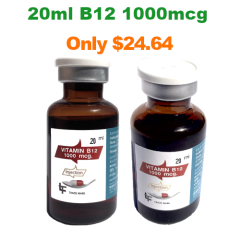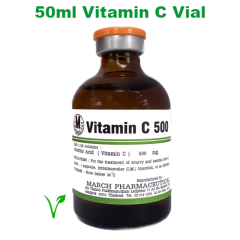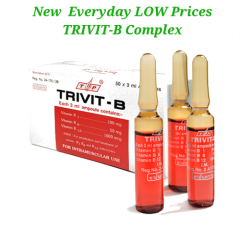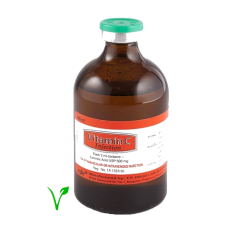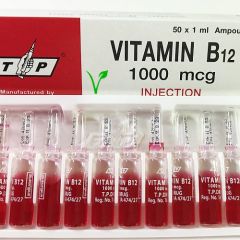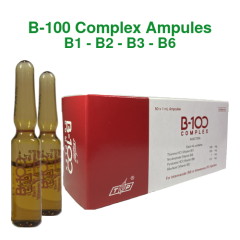The Benefits and Risks of B12 Injections
The Benefits and Risks of B12 Injections Part 1
Vitamin B12 deficiency is now thought to be far more common than previously suspected. In fact, scientists now believe that it might be one of the most common nutrient deficiencies. This is especially true for strict vegans and vegetarians, elderly, diabetics, and those taking antibiotic medications or drugs that alter stomach acidity. Those taking birth control or undergoing hormonal replacement therapy should also consider monitoring their B12 levels. For these reasons and many more, B12 injections are prescribed to repair the symptoms of vitamin B12 deficiency.
Common B12 deficiency symptoms are low concentration, fatigue, weakness and depressed moods. B12 deficiency can effect red blood cell formation and elevate homocysteine levels causing consequences that are more serious. Homocysteine is an amino acid created in the body and elevated levels are linked to pregnancy risks, heart disease, immune system issues and lethal blood clots that potentially can cause strokes.
Certain conditions such as celiac, Chron’s and pancreatic diseases, gastrointestinal surgeries, and alcoholism cause absorption impairment. Chronic stomach inflammation can contribute to a vitamin B12 malabsorption problem named pernicious anemia. Vitamin B12 concentrations are high in protein rich foods but even if your diet is protein rich, it is possible that you can be B12 deficient.
B12 injections are administered to swiftly increase levels of vitamin B12 in persons with B12 deficiencies; they contain high doses of vitamin B12. They are normally available by prescription only and dosage depends on individual needs per their deficiency source. Some people require weekly injections and others monthly.
Are B12 injections the answer to repairing the health of those with low levels of vitamin B12? The benefits of vitamin B12 and receiving B12 injections are that it can increase energy, build muscle tone, improve your mood, add protection to cognitive decline and combat heart disease, but there are some risks to be aware.
Are injections of Vitamin B12 the cure-all for all persons with low vitamin B12 levels and symptoms? Injections can’t always resolve the source of problem deficiency, so they are not the final solution to curing the causes of symptoms.
What does Vitamin B12 do for the body?

B12 Cobalamin is vital to efficient functioning of the body and a crucial vitamin needed for over one hundred daily functions. It is a key ingredient for helping convert and synthesize many other compounds within the human body. It aids in metabolic and hormonal functions, producing digestive enzymes, and importing and exporting nutrients to cells.
Vitamin B12 and all the B vitamins are important for turning food into fuel. B12 assists the other B vitamins by facilitating metabolic conversion of proteins into fats that then become fuel. B12 works together with folate B9 in many biochemical pathways and helps convert homocysteine into methionine. This process transforms folate into the active form needed to make DNA.
B12 has a role in other crucial bodily functions such as
- Forming red blood cells. Red blood cells deliver oxygen throughout the body and remove carbon dioxide from the body.
- Protecting nerve cells by protecting the myelin sheaths of brain cells.
- Supports DNA replication, keeping your cells younger, thus you younger. Supports normal fetal growth and development.
- Protects your heart by controlling homocysteine.
- Feeds your cells so that they can produce energy for clear thinking and actions.
- Helps fight depression. Studies show that patients hospitalized for depression had low levels of B12. It is thought to aid in synthesizing serotonin.
- Aids in in the production of hormones.
How do you check your vitamin B12 levels?
Blood serum tests are the most common test but do not deliver the most accurate results of a person’s overall vitamin B12 level. Serum test levels range from 170-250 picogram per milliliter and any value below 200 picogram is considered a deficiency in adults. In Europe and Japan, the lower limit is 500-550 picogram per milliliter, maintaining a higher level is healthy.
The reason that blood serum tests often produce inaccurate levels is because high levels of vitamin B12 are stored in the liver and taking large amounts of folic acid can mask B12 deficiency. If you still have B12 deficiency symptoms then an MMA test is recommended so that you can have a more complete picture of your vitamin B12 levels.
The National Institute of Health states that the two forms of active vitamin B12 are named methylcobalamin and 5-deoxyadenosylcobalamin. They are referred to as cobalamin because vitamin B12 contains the mineral cobalt. A majority of B12 supplements contain cyanocobalamin that easily converts to the vitamin’s active forms.
The caveat is that just because it is converted it does not mean that the body’s absorption rate is high. For the stomach to absorb vitamin B12 properly, a person’s intrinsic factor has to be functioning properly. The intrinsic factor binds to vitamin B12 when it reaches the stomach and enables the B12 to survive the journey through the stomach and into the small intestine.
People with genetic or post-surgical conditions that block absorption and people with pernicious anemia are those most commonly prescribed vitamin B12 injections. Studies such as the Tufts University study have shown that even people living in industrialized countries are often deficient of vitamin B12. Pernicious anemia increases the risk of neurological difficulties.

